Feed aggregator
Doki Monsters: Quest Review - Nostalgic Yet New
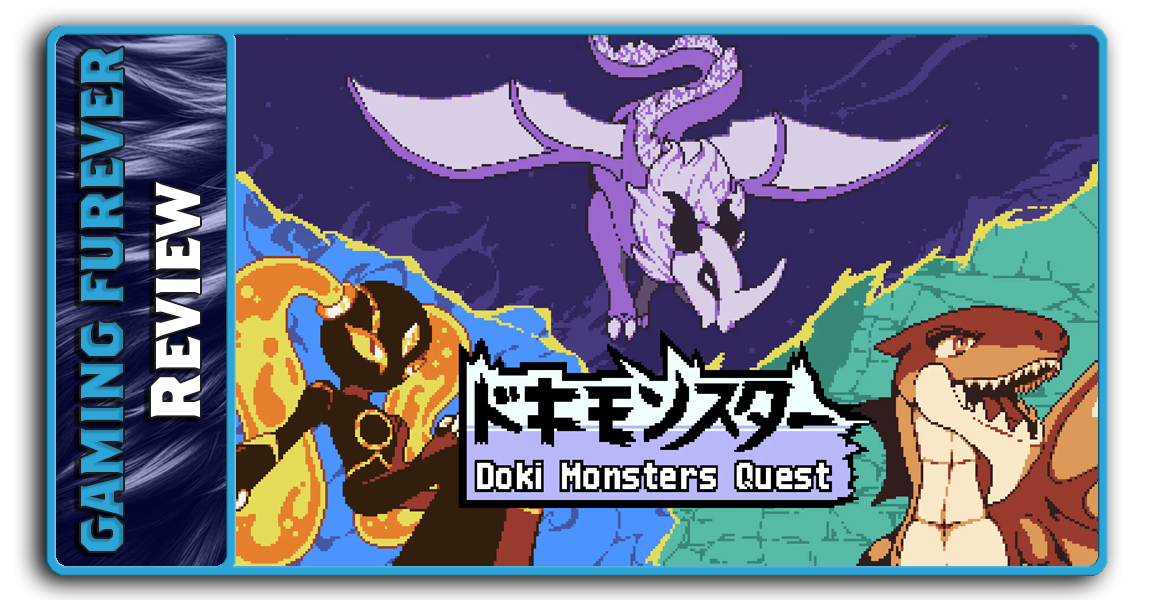
If you’re like me, you probably grew up with a Game Boy Color back in the day and poured hours into 8-bit adventures. I fondly remember my time with games like Dragon Quest IV, Oracle of Ages and a few others. Back in those days, the technology wasn’t very sophisticated, so game design was much simpler and exploration wasn’t guided by nav points. It’s that kind of nostalgia that Doki Monsters Quest chooses to invoke. Memories of bygone days where game mechanics were explained in booklets rather than in the game itself. This philosophy of old meets new works to both Doki Monsters benefit and its deficit.
Brandon's 2025 at GF: A Look Back

Welcome to something a bit different. Rather than a traditional Game of the Year style list where I choose my favorites, I’ve instead decided to just take a look back at the various games I played and reviewed on this site alongside a few highlights. My work for GF this year has mostly been these reviews with the occasional preview and news article. Speaking of news, one of the biggest things to happen was the Nintendo Switch 2 and while I probably won’t be getting one for a while, it’s already seen a ton of coverage and support. I’ve covered the news surrounding it a few times and what I’ve seen of it has looked pretty good. It does mean however, that support for Switch 1(at least from first-party developers) is nearing its end. But it's been great to do reviews on my Switch for as long as I have. Cheers Nintendo. I got a few more memories with you this year at least.
TigerTails Radio Season 16 Episode 46

TigerTails Radio Season 16 Episode 46 Join the Discord Chat: https://discord.gg/SQ5QuRf Join the Telegram Chat: https://t.me/+yold2C77m0I1MmM0 Visit the website at http://www.tigertailsradio.co.uk. See website for full breakdown of any song credits, which is usually updated shortly after the show. Credits: Opening music: Magic by Hedge Haiden (Double Hedge Studios) Character art: Fitzroy Fox - https://www.furaffinity.net/user/lunara-toons / https://bsky.app/profile/fitzroyfox.bsky.social Background art: Charleston Rat - https://www.furaffinity.net/user/charlestonrat / https://bsky.app/profile/charlestonrat.bsky.social If you like what we do and wish to throw some pennies our way to support us, please consider sending a little tip our way. https://streamlabs.com/tigertailsradio/tip * Please note, tips are made to support TigerTails Radio and are assumed as made with good faith, so are therefore non-refundable. Thank you for your support and understanding.
Owners of Inkedfur, Exotic Erotics, and Party Animals West finally accountable for abuse, but a deeper problem remains

Owners of 3 businesses capitalized on fandom despite years of complaints. Now they face consequences for contributing to the abuse of children and animals:
- (1) Inkedfur owner arrested. Inkedfur is a printing service used by popular furry adult artists since 2014. The owner Sangie had a sex crime conviction in the 2000’s, and kept raising allegations of shady business and pedophilia while dealing at conventions that disregarded his record. He was recently arrested again as part of an FBI operation against child sex abuse. The arrest was in May 2025, but it doesn’t seem to have reached community notice yet.
- (2) Exotic Erotics rejected. Exotic Erotics sells sex toys, including “life cast” toys made by manipulating real animals’ genitalia. This pushed the adult market deep into murky ethics, but they kept being welcome next to regular dealers at conventions from 2009 to 2025. It’s never too late to stop ignoring things, and their inclusion at Midwest Furfest 2025 raised a storm of protest on social media before the con parted ways with them.
- (3) Party Animals West owner convicted. Party Animals West (PAW) rented clubs for parties attended by hundreds, with a group of 1000 supporters. The owner Frisky was reported to police for CSAM possession years ago when his parties were based in Las Vegas, with no results. He got away from the allegations by relocating and resuming operation in the San Francisco Bay area, until he was arrested for new child abuse in 2024. Other group runners allowed the child victim inside after being warned of risk and overruling it; and a fellow group runner was arrested for the same crimes. Associates tried to bury it, but Frisky was just convicted in late 2025.
This story updates previous Dogpatch Press reporting about abuse by the owners of Inkedfur and Party Animals West. Despite known histories, they prospered while continuing to do things they were accused of for many years. The time it took for consequences goes to show that legal action isn’t a solution by itself, especially when abusers keep influence and favor in the community. Delaying makes more victims while waiting for outsiders to do something — if they ever do anything at all — and shows a deeper problem to change inside.
The furry community likes to take pride in being built by and for each other. If we aren’t lying to ourselves by burying abuse while predators prosper, we can scrutinize who is in power and use more discretion about who gets support. Not just on social media, or at one weekend conventions, but in real life all the time.
It’s all wrapped up after the first 3 sections with part 4: Cronies Against Accountability.

(1) Inkedfur owner James Christopher Hoyt (“Sangie Nativus”) arrested for child sex crime again

2025 mugshot of James “Sangie” Hoyt
When Inkedfur was founded in 2014, its owner Sangie had a murky history. He publicly admitted being convicted in 2008 for crime with a child, but got it expunged. This made records hard to come by, while Sangie posted self-serving stories about court bias and lied that he was tricked about his victim’s age. It worked enough to at least distract critics who couldn’t verify why records were expunged. Meanwhile, he would threaten conventions with legal action if they rejected his business, and covered himself more by throwing other abusers under the bus.
One abuser who Sangie leaked on was his good friend Levi “Snakething” Simmons, a ringleader in the 2018 Zoosadist Leaks. It’s incomprehensible to read Sangie’s private interaction with Simmons — who set up his minor nephew as prey for tag-team grooming — and wonder how Sangie wasn’t arrested for it. Legal documents reference Sangie involved in planning crimes that put Simmons in jail for 25 years. This got Sangie’s grooming featured in a 15,000-word Dogpatch Press report about the Zoosadist Leaks, which took intense effort to publish against backlash in 2019. Attacking sources is very helpful to manipulators like Sangie, while some people trying to get him reported would also attack for not getting instant results during active investigation, helping him even more!
[Edit: for more insight on how Sangie manipulated information, compare edits he made to a Wikifur page about him, changing a pedophile label to “accusations” based on “inaccuracies” because his 2008 conviction was “not a sex offense” and that he thought his victim was 19. Legal docs of his current case refute this. He admitted to prior sexual relations with a minor before the one he was convicted for in 2008, while possessing hundreds of illegal images. He took advantage of lying about records that were expunged.]
This explains how Sangie delayed notice… but not how conventions chose a shady dealer like Inkedfur in their selection process. Reporting about him came and went while he kept profiting from porn by popular furry artists. Inkedfur even sponsored a popular fandom lawyer’s blog (later reconsidered.) However, even as a normal businessman, Sangie couldn’t keep out of controversy. Allegations rose about cheating, like selling prints by artists who cut ties, with excuses about clearing old stock when it was print-on-demand, and failing to pay royalties. Social media threads document allegations against Sangie for business cheating and pedophilia, including grooming new victims during Inkedfur operation.

Fake leadership change is a PR deception we’ve seen before – beware!
In 2025, Sangie’s luck ran out. Read about his bust: Justice Department Announces Results of Operation Restore Justice: 205 Child Sex Abuse Offenders Arrested in FBI-led Nationwide Crackdown, Including 5 in the Western District of Texas. “James Christopher Hoyt in Austin charged with distribution of material involved the sexual exploitation of children.”
Legal docs of the case say Sangie was living in a mobile home, outside a property with internet provided by another subscriber, but he used his personal device to download and distribute CSAM… 170,000 images of it. That’s over 3 times more than the infamously huge collection of Jared from Subway. On one pedophile forum, Sangie created a thread for “furry boys” with costume parts on nude children between ages 2 and 10. When interviewed, he admitted having sexual relations with multiple minors up through 2018. He has appealed for release on medical grounds of having cancer (did this start with the worst possible YOLO move in history?) The court denied his release due to:
“the combination of his prior criminal conduct with the vast collection of child pornography and his continued involvement in the distribution of child pornography with others…” and “the danger he poses to the community and the risk that he will reoffend if given access to the internet or contact with vulnerable populations.”
Legal docs also mention bestiality in Sangie’s collection, a common overlap of abuse on vulnerable victims who can’t consent.

(2) Exotic Erotics rejected from Midwest Furfest — “Zoo Positive” business was welcome at cons for many years
Exotic Erotics is an adult toy company that sells fantasy animal dildos, similar to the higher-profile Bad Dragon, but with a more specific niche. Instead of sculpting from imagination, they make toys by manipulating and molding real dog and horse genitalia. Critics say lifecasting is real-life abuse. A guest tells Dogpatch Press: “If this were life-casting off a human child, this would be national headlines kinda bad”.
Here’s a guest-submitted look at the controversy:
When you think of zoophiles, and horrible things they do to animals, here’s one that not many people talk about. The company Exotic Erotics was founded in 2009, and is based somewhere in Shelbyville, Kentucky. Most of their toys are sculpted or 3D printed like adult novelties are normally made, but Exotic Erotics also bases them on molds of the genitalia of live animals. They are very open about putting lifecast toys on their front page.
Before Bad Dragon existed, its CEO Varka had discussed the concept on the now defunct site “Herpy.net”. On December 7, 2007, Varka posted about starting an adult toy business, and wanting to get his hands on live animals to create lifecasts of their genitalia. Varka ditched that idea in favor of hand-sculpting, but is that where it started? The founding of these two companies were very close to each other. Bad Dragon was founded in 2008 and Exotic Erotics in 2009. Both have stayed in business since then. You’d think that Exotic Erotics’ actions would spark serious controversy and trouble, and complaints have circulated before, but not effectively. From 2009 to 2025, they remained eligible to be selected to vend at large furry cons (15 years at Midwest Furfest).
How does Exotic Erotics deflect complaints? They claim “lifecasting is incredibly similar to the methods at breeders all over the world”, and the animals “are happy to help” and “into the process”. Something tells me that dogs and horses are not into being restrained and having their privates forced into a mold. Exotic Erotics compares it to semen collection; but doing this isn’t necessary for animals to exist, and I don’t think veterinarians and breeders go out of their way to sexually gratify people that way. Another thing to note is that abusers love making excuses to cover up their true intentions or blame their victims. It’s a big case of “trust me bro” when there’s no regulation or explanation from anyone but humans who gratify and profit themselves this way. We’re taking the word of a sex toy company. They could sculpt toys without doing this; nothing about it shows caring for animals. (- guest “Shadow Roach”)
- Exotic Erotics selected to vend at Furry Weekend Atlanta
- Exotic Erotics selected to vend at Midwest Furfest
- Bad Dragon is also “swimming in zoophiles” (comparing this to “just fantasy” doesn’t imply good alternatives.)
Exotic Erotics justifies their sales by claiming they quit using the method earlier, and they used 3D-scanning, or it’s just as bad as other things done to animals. It’s already dubious to trust salesmen who keep profiting from original exploitation, but there’s more. Their business is opaque, but critics are making the connection to courting a zoophile base. Exotic Erotics can deny knowing (wink) — but that’s just a technical hair-split away from making community for abusers, and technicality is no protection for victims who can’t tell. Take it from a group of 911 zoophiles who rate them as “zoo positive”:


That’s one underground group of many, where nearly 1000 zoophiles are networking with each other in a way that would scarcely be possible in real life, and they see enabling to go aboveground with Exotic Erotics.
There’s still a “show your work” challenge to identify zoophile networking inside Exotic Erotics, so here’s one of their employees spreading standard zoo-propaganda about consent. The Laelaps anti-zoophile labeler collected these statements as evidence for a zoophile supporter label.

“Enthusiastic consent means seeking out a clear, positive ‘yes’—not just the absence of ‘no.'” – RAINN

With this background, Exotic Erotics selection for Midwest Furfest 2025 raised a storm of protest on social media. Some problems with that…
- It can risk raising attention that helps Exotic Erotics sell more toys. They boasted about their Black Friday sales and made claims about restocking (below).
- Cons can get sued for breach of contract for canceling a vendor. If you want lasting change inside, with staff on your side, a con organizer told Dogpatch Press: persuade them to use discretion for the selection process next year, using calm direct communication, like stakeholders emailing together, instead of threats or social media callouts. That’s how to affect the other 49 weekends of the year.
Protesters did see a change, at least for now. Exotic Erotics says they stayed home for safety from threats, and Midwest Furfest will revisit the dealer process.

Possibilities: (1) Attention helped them to sell all their stuff to sympathizers. (2) Laying low to let callouts die out, or to deal with orders being charged back or lost payment processing.

[Opinion about strategy] Exotic Erotics is one small company of many, and certain people will keep thinking “lifecasting sounds good to me”. Remember:
- Arguing can raise attention and sales, but you can say consent isn’t debatable.
- Toys aren’t essential to make animals exist like vet or breeder practices do, and boycott is using the free market too.
- Communities can decide standards without having anything to do with government censorship (or “kink shaming.”)
- Zoophiles don’t deserve neutrality to use our spaces any more than churches need to assume they’ll always have pedophiles within.
- For many years they enjoyed “technically legal” acceptance and weak discretion. At this point in time, we have organized NAMBLA-like groups taking advantage of internet platforms to grow, then ride the coattails of our conventions and money into real life, so the only line left is us.
- If you don’t want to be doormats, it can start with drawing a line about organized money-making support. It doesn’t prevent them from existing, but puts values on whether organized zoophiles are more entitled to community than victims are entitled to protection from them.
Ponder the awkwardness that was averted, because an update to the Midwest Furfest security policy also now requires you to carry things in clear backpacks.

(3) Convictions of Party Animals West owner Steven “Frisky” Darling and Leonardo “Naughty Kitty” Medina — they had access to victim after warnings

Steven “Frisky” Darling
Background from 2024: Bad leadership surrounds sex crime case with Party Animals West (PAW) owner in San Francisco. Deeper details here are sourced from chat logs, numerous source interviews, legal docs, and police who agreed to speak.
In 2017, Steven “Frisky” Darling was reported to police in Las Vegas for possessing CSAM. Nothing came of it while Darling moved his PAW events to San Francisco. The parties rented large, mainstream clubs, were attended by hundreds of furries, and ran with a volunteer crew. They grew influence and support under Darling’s ownership, like a Telegram group of 1000 members managed by his crew. A source inside alludes to Darling using manipulation to keep tight control, and receiving large amounts of money. (Drugs are a topic for another story…)
A problem started independently in 2023, when San Francisco bay area furry groups circulated bewares about a 14 year old member who was posing as an adult to get into adult spaces, and sexting adults. It caused great distress to those who found out the true age and high danger. Some group runners removed the 14 year old for being a risk to self and others. A few refused.
One who would not fully remove the child was San Rafael CA-based veterinarian Mark “Zarafa” Willett. Willett is one of the organizers of a monthly furmeet, and a group named North Bay Furs. Willett, who is in his 60’s, stated that he stood by accommodating a risky 14 year old because the child was “desperate for social connection”. A 60-something gave a child’s desperation priority over everyone’s risk, which of course, meant keeping the elder’s own following instead of directing the child to activities with other children. There’s quite a lot more reason to deeply question this adult’s influence, when many people a third his age could tell this would lead to trouble.

Fursuits used by Medina
Meanwhile, a nearby group was run by Leonardo “Naughty Kitty” Medina, named Northbay area Fur-meets (not the same as Willett’s North Bay Furs). Medina also grew influence with events, despite one of his admins quitting because of seeing tolerance for creepy behavior with minors there. Chat logs show Willett advised Medina about naming the group, and called it “sort of a duplicate of the one we run” (more on this below). Willett’s own management also put Medina in North Bay Furs and enabled access to a 14 year old.
It’s not clear how Medina came to know Darling, but they had plenty of time to take advantage of influence until their coinciding arrests in 2024. Legal docs show they were abusing a 14 year old.
NEWS: In November 2025, Darling’s plea of no contest/guilty led to his conviction and sex offender registration. Sources believe his jail time will be 2 years. Medina gave the same plea.
How many others were involved? At the time of Medina’s arrest, his partner and co-organizer disappeared with no info about if he was involved, was a witness, or simply quit a broken scene. The convictions also don’t cover all of the activity. A police officer in Darling’s case told Dogpatch Press that Darling wasn’t just doing child abuse, he was also involved in bestiality. Tips are welcome if you have more information.


(4) Cronies against accountability
Look back at prior reporting of how Darling’s crew tried to cover up his arrest in 2024 to keep the parties going. Then let’s look at an even deeper pattern.
Back in 2018, one of the people who became Darling’s crew, Tyler “Leko” Mark, tried to stop Dogpatch Press from reporting about his predator boyfriend (“Tane”). Leko asked for coverup, and after it was denied, then asked his friend Mark “Zarafa” Willett for dox to use for threats. Willett negligently gave out the dox, and later explained that he doxed someone under his group leadership because Leko was his friend. The resulting threats didn’t stop reporting about abusers getting favor at conventions. Leko went on to enable the same predator boyfriend inside staff of Las Vegas Fur Con. When news broke of Darling’s arrest, Leko also tried but failed to keep Darling’s PAW parties partnered with Las Vegas Fur Con. LVFC ended relations with PAW, but Leko remains staff and enabler at many cons.
Willett was directly questioned about enabling a 14-year-old after being warned of risk. He was also questioned about a pattern with people involved in abusive activity who he brought into the community, befriended, defended, or protected — without screening very obvious red flags — and doing whatever he possibly could do to deny evidence that was pointed out to him. This was one friend he went out of his way to defend, with confrontation Willett started himself, ignoring multiple reports of groping by that friend, and putting the risk on group members to watch their own backs.
A private file collects Willett’s responses full of selective memory, semantic word games, claims of ignorance, refusal to answer, shifting blame, and playing helpless victim. He was the one with power for decisions he made while blaming anyone but himself. Willett’s excuse for keeping the 14 year old was shifting responsibility to the parent, who he did nothing to screen, which apparently was enough to disregard the rest of the community and all the distress they suffered.

Obvious zoophile who he brought into furry fandom and did not take out.

When a group runner can’t face the result of their own negligence
No furry group runner has openly addressed how risk warnings were overruled, before two fellow group runners used their influence to prey on a child member. There’s no apology, promise to do better, or admitting that negligence does harm. That’s nothing surprising to some sources who have tried to engage Willett about past cases of dangerous people in the community.
One former runner of a defunct group, who backed away from furry fandom over this, spoke about experiences with Willett’s unsavory influence and intentions for founding his North Bay Furs group.
Willet founded North Bay Furs with a “no shaming” rule, because of growing bitter at the management of the previous local group for holding pedophiles accountable, says the source. (Around 2018 Willett said the same directly to Dogpatch Press.)
That defunct group runner recalled Willett as “oddly defensive” about the topic, said Willett refused to condemn or address it, misused his influence to undermine people that held people accountable, and called accountability “toxic”.



Willett’s group is only joined by direct private invite. With the founding reason of the group making a bubble of toxic positivity, where “offensive” criticism gets removed, fake neutrality is more selective than it would be to reduce extreme tolerance given to problem friends as if nothing can be done. How ironic that the pedo-shame that irked Willett so much came true in the place he made to shirk it.
After the arrest of Medina, Willett went into Medina’s now-leaderless group, labeling it a “duplicate” while directing members to join his North Bay Furs. Gaining followers that way is convenient, when it became leaderless at the cost of an abused child, after Willett’s decision of acceptable risk. Here’s a case to remember if we want to know how negligent leadership falls upwards.
The pattern in this story isn’t just with a few abusers who were caught. It’s also the influence of cronies and enablers who have been at it for too long, a type we keep having to beware of, making a minefield for trusting anyone at all. Their bubbles are full of a cultishly dogmatic attitude that their critics are enemies, while they’re trying to boost the fandom by keeping the parties going, stopping negative image, welcoming everyone, and keeping everything cuddly and bright. The uncomfortable truth is that they’re selfishly protecting their own comfort, no matter who gets hurt and how they have to deny it.
For many who are frustrated about this, protest brings something more positive than toxic positivity: catharsis.
Like the article? These take hard work. For more free furry news, follow on Twitter or support not-for-profit Dogpatch Press on Patreon. Want to get involved? Try these subreddits: r/furrydiscuss for news or r/waginheaven for the best of the community. Or send guest writing here. (Content Policy.)
Sonova Spider
At the Lightbox Expo this year we met Greg Anderson-Elysee and learned about his graphic novel series, Is’Nana the Were-Spider. “Accidentally breaking a barrier between our world and theirs (called “The Mother Kingdom”), Is’nana, the son of Anansi (The West African God of Spiders) accepts the responsibility for releasing creatures of horror into our world, villains who want nothing more but to cause chaos and mayhem to achieve their own diabolical or selfish goals. With guidance from his father, Is’nana not only strives to live up to his father’s name but to also reach his own potential while he seeks to discover his individuality and place in the world.” Lots of animal-based gods and demons to be found here, all rendered in a dynamic painting style by artists Walter Ostlie and Lee Milewski. Find out more (and see all the issues) at the Webway Comics site.
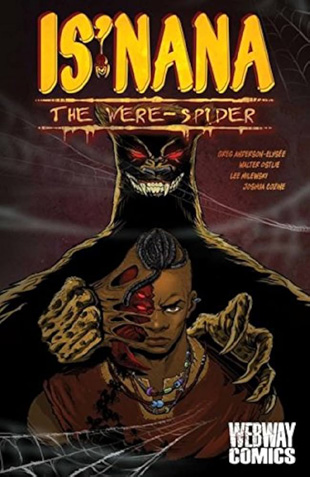
image c. 2025 Webway Comics
Squirrel with a Gun Adds Varmint Collection Free Update

If you haven't played Squirrel with a Gun, you've been missing out! Our team at Uncivil Gamers very much enjoyed the time we spent with it during our Uncivil Weekly Release Party video recording. Squirrel with a Gun today received the Varmint Collection update, now playable on Steam, Epic, PlayStation 5, and Xbox Series X|S, with Nintendo Switch 2 to arrive soon, announced publisher Maximum Entertainment and developer Dee Dee Creations. The brand-new free DLC adds a slew of mischievous critters to the game’s squirrely action. Take a peek at the Varmint Collection’s wacky additions in today’s trailer:
BROK: The Brawl Bar Review

The world inside the indie hit BROK the InvestiGator has more to give, as solo developer COWCAT (Breton Fabrice) brings the new standalone title BROK: The Brawl Bar to consoles and PC. The Brawl Bar is a wild party beat ‘em up that features over 60 varied and surprising arcade-style “Event matches” (à la Smash Bros) that range from easy to difficult to complete. Throughout your pursuit of knocking out all of these challenges, you’ll get to know a few of the patrons and staff in this “brawl bar” you find yourself drawn to as you try and rekindle those fighting flames your gator-y self used to love sparking. Though I took my lickings in some of the harder stages, BROK: The Brawl Bar was an exciting game to punch, kick, and finesse my way through.
TigerTails Radio Season 16 Episode 45

TigerTails Radio Season 16 Episode 45 Join the Discord Chat: https://discord.gg/SQ5QuRf Join the Telegram Chat: https://t.me/+yold2C77m0I1MmM0 Visit the website at http://www.tigertailsradio.co.uk. See website for full breakdown of any song credits, which is usually updated shortly after the show. Credits: Opening music: Magic by Hedge Haiden (Double Hedge Studios) Character art: Fitzroy Fox - https://www.furaffinity.net/user/lunara-toons / https://bsky.app/profile/fitzroyfox.bsky.social Background art: Charleston Rat - https://www.furaffinity.net/user/charlestonrat / https://bsky.app/profile/charlestonrat.bsky.social If you like what we do and wish to throw some pennies our way to support us, please consider sending a little tip our way. https://streamlabs.com/tigertailsradio/tip * Please note, tips are made to support TigerTails Radio and are assumed as made with good faith, so are therefore non-refundable. Thank you for your support and understanding.
S12E4 – Escapism and Furry
Anthropomorphism – it’s the shared interest that unites this fandom. For some, it’s a hobby. For others, it’s a way they see or express themselves. Or is it just a way for some folks to escape the world around them – and is that a good or bad thing?
Episodes are now streamed live on Twitch.tv. After which, the video and audio only formats will be posted within the week after the stream. You can find us on Twitch at FurWhatItsWorth!
NOW LISTEN!
SHOW NOTES Thank you!Those that were able to join the livestream!
To all of our listeners! And your continued support!
PATREON LOVETHANK YOU to our patreons! You help us keep the show going!
A Cookie Factory – OwO
*empty*
A Pallet of Cookies

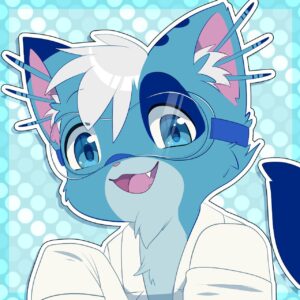
Barnaby Panda, Nuka, Lou Duck (Pic Pending)
A Case of Cookies

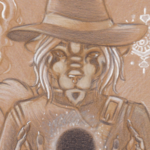

Basel the Dragon, Black Baldrik, Ichigo Ookami (Pic Pending), Lufis the Raccoon
A Jar of Cookies
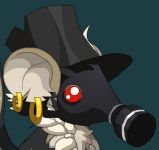
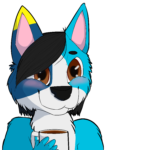

MephistophEli, Plug, Tenax
A Box of Cookies
- Benji
- Lygris
A Delicious Cookie
- Ausi K
- Christian
- Citrus Fox
- Icy Solid
- Ralley
- Sage Lightfang
- TyR
- Victor Mutt
- Intro: RetroSpecter – Cloud Fields (RetroSpecter Mix). USA: Unpublished, 2018. ©2011-2018 Fur What It’s Worth. Based on Fredrik Miller – Cloud Fields (Century Mix). USA: Bandcamp, 2011. ©2011 Fur What It’s Worth
- Patreon: Inflammatus – The Tudor Consort, Creative Commons 2019
- Closing: Cloud Fields (RetroSpecterChill Remix), USA: Unpublished, 2018. ©2011-2018 Fur What It’s Worth. Based on Fredrik Miller – Cloud Fields (Chill Out Mix). USA: Bandcamp, 2011. ©2011 Fur What It’s Worth
Jurassic World Evolution 3 Review (Xbox)
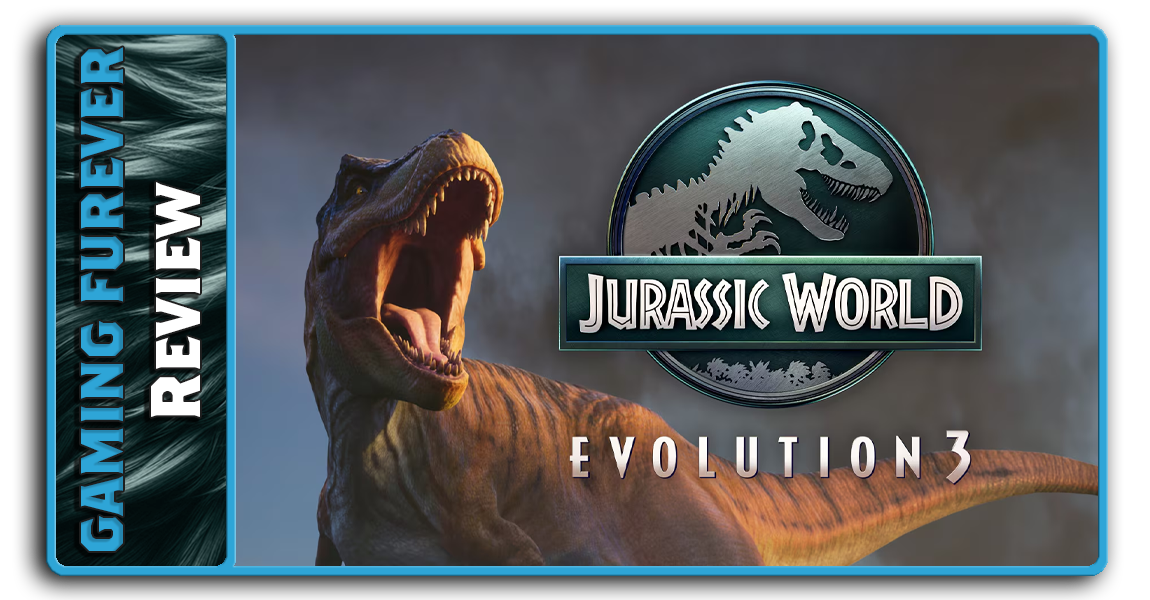
Let me start this review by saying that I’m really not the biggest fan of the Jurassic Park franchise. I’ve read the first book back in middle school and seen some of the first Jurassic Park at a young age but that’s about it. Truthfully, the first film kinda freaked me out at that young age and scared me to the point where I won’t even watch the series at all (Silly, I know). I also haven’t really kept up with the gaming side of the franchise, but occasionally one does enter my radar. Which is where Jurassic World Evolution 3 comes in: The third entry in the park building Evolution series. I do want to stress that I’ll be approaching this review as a casual park builder player so I won’t be going too in-depth with what’s on offer. With that being said, this is a fun game but it has some issues that I feel may hurt the enjoyment for many casual gamers.
FWG Newsletter December 2025
December has arrived! It’s the jolliest time of year – and you can be sure that the Guild has some early presents under the tree.
First of all – allow me to introduce myself. My name is Gabe Foxx – editor, publisher, all-round writing girl, and longtime FWG author myself. Lovely to meet you all!
To explain why I’m here, and why you’ll be hearing a lot more from me – I recently stepped up as guild president, and will hold the post alongside Kate until taking the reins completely in April to allow her some much-deserved rest after two long, dutiful years of service. It will be an absolute honor to work with and support all of you!
With my background in marketing, and my position as the founder and director of soon-to-debut Doppelfoxx Publishing – the fandom’s first globally-focused publishing and distribution house – I aim to bring fresh passion, professional edge, and a world of new opportunities to the Guild and its members for a long time to come.
Speaking of which! Secondly, and much more interestingly, is the exciting news that we’ve been teasing for quite some time! (Just to build up suspense, of course. Everything’s gone completely according to plan.)
You’ve waited long enough – so, with no further ado, let’s unwrap!
Thanks to the hard work of our admin team, especially our Advocate With Other Organizations (AWOO) Tempe O’Kun, the FWG is proud to announce that we are launching a member-exclusive audio fiction narration service pulling from a list of professional voice actors that will continue to grow over time!
With the help of this initiative, our writers can now commission experienced furry, cartoon, and anime voice actors to narrate their works, using a clear, budget-friendly commission structure similar to that we’re all used to working with for cover art and illustrations. This is your easy, convenient chance to easily break into the audiobook market, diversify your offerings, and put a voice to your work that fits, delivers, and brings their characters to life.
For a full rundown on details and how this came about, however, I’ll leave credit where credit is due, and hand the proverbial mic to our AWOO himself, Tempe O’Kun!
Until you hear from me again – warmest wishes, seasons’ greetings, and take care!
Gabe Foxx
Written by Tempo O’Kun, Furry Writers Guild Advocate With Other Organizations (AWOO)
TL;DR: FWG members can now hire furry/anime/cartoon voice actors to narrate their books and short stories.
Member-Exclusive Audio Fiction Narrator ListWait, what?! How’d this happen?
First off, I’m buddies with Bodi from Rock Dog. Specifically, I’m pals with Graham Hamilton, voice actor for the main character in the second and third movies.

Badge I made him for when he attended VancouFur. Tibetan translation by Bearywell. (Source: https://www.furaffinity.net/view/60395198)
I interviewed him for Furry Film Burrow a few years ago.
He’s a good dude. He’s been super curious about the fandom. He’s also been learning more about Tibetan culture from furries of that country, so as to voice Bodi more authentically.
Graham and I were talking a couple weeks ago. I asked if he had ever considered narrating (furry) audiobooks. He said sure, but he’s a member of the Union of British Columbia Performers, so the union had rules anyone who hired him had to follow. These rules are designed to keep large corporations from bullying individual voice actors, but they’re complex enough to be daunting for any author looking to hire a voice actor.
That said, the thing about actors’ unions is they want their members to make money and create art. So I reported this back to the FWG leadership, who decided it was worth reaching out. We’re always on the prowl for new ways the Guild can benefit furry writers, so this was deemed an excellent scheme.
And so it came to pass that I set up a meeting with the union that represents the My Little Pony voice actors.
How to AWOOLet me tell you about being the Furry Writers Guild’s AWOO. I’m the Guild’s tame extrovert. Most furries have a sense of shame, which is a feature I’ve never unlocked. I’m also a dog. Thus, I simply leverage the fact that people like it when a doggo shows up and befriends them. It works just as well outside the fandom.
I reach out to people about crazy projects regularly—furries, non-furries, whomever. I get rejected about three-quarters of the time. As with writing, that just means you need to keep trying.
The Pony UnionThe UBCP was a little surprised I reached out. I am a medium-size person and not a giant corporation. Having an organization of 340 indie authors reach out is unusual. Also, I’m a cartoon dog. They’re used to talking *for* cartoon animals, not *with* them.
Jason, their rep, was super helpful in navigating the process. He helped us navigate the rules and set up a simplified process for how much union voice actors can be paid. Normally, the rates include different rates for different stages of the project and possibly even recurring payments for decades. That’s easy if you have an accounting department, but furry authors generally do not.
Also, turns out that the Vancouver acting scene calls anybody who’s been on My Little Pony a “pony” forever, so he talked about hiring “the ponies” for the duration of the call. As a furry, this satisfied me on a linguistic level.
The weirdest part for UBCP was that we were flipping the whole process around. Studios out a casting call, get in touch with agents and talent agencies, and might even call people back for multiple rounds of live try-outs. That’s a lot of work for one person to do, however, especially if that person would rather be writing. What FWG wanted was an old-fashioned furry art commission. We wanted authors to be able to commission voice acting like we do book covers. (My constant references to “the commissioner” initially left Jason thinking I was talking about the guy in charge of the Bat Signal—just not a term they use in the VA industry.)
It was actually really cool to have a guild-to-union conversation like this. I don’t know if we’ve ever had one. Just goes to show you the power of professional organizing. The only way we were able to make this happen was because FWG is a union and we could promise 1) a single point of contact for negotiation and dispute resolution and 2) that we had vetted the folks who’d have access to voice actors and could enforce a code of conduct.
After the meeting, we had a green light. While UBCP covers voice acting in Canada, the process was really helpful in covering the basics, so that pro voice actors in any country could sign on. But wait! We wanted voice actors from inside the fandom too!
Ethically-Sourced Fandom-Local Voice ActingI really like audio fiction. I’ve had stories on The Voice of Dog and recorded the Puplift series for Furry Film Burrow.
So it should come as no shock to you that I’m buddies with Savrin Drake, Dralen Dragonfox, and assorted other fluffs and floofs of the furry voice acting world. Many of them are always on the lookout for more projects. They basically get work by word of mouth only, so this was a handy way for FWG members to make offers to commission voice actors.
You might think furry voice actors wouldn’t want the competition from cartoon voice actors, but they thought it was super cool to be working in the same space (they’re fans too, after all). And given that union minimum is two or three times what furry narrators charge, we have a nice spectrum of audiobook budgets.
I specifically recruited The Voice of Dog’s talent because they all clearly have experience and have finished at least one project. Any furry can go listen to their work at any time. Many of them have worked on a lot of other cool projects too, so we included space for that on the list entries.
We still had a little room left on the project, though, which is just enough for a fennec…
The Fennec ConnectionI’m also pals with Fenneko from Aggretsuko.

Badge I made her for DenFur. Ears and tails by FantasticallyFluffy. (Source: https://www.furaffinity.net/view/60395444/)
Like Graham, I met Katelyn Gault when I interviewed her for Furry Film Burrow on YouTube.
We still talk about theatre prop construction and fennecs. (She had worked with fennecs in real life as a volunteer before voicing Fenneko!) She is also the best. She’s taken to furry fame like a fennec to sand, mostly because she gets why people get so passionate about their fandoms and is so willing to yap with fans.
Feeling LackadaisicalOh, and I’m also the lead developer of the Lackadaisy card game, so I made sure to reach out via Tracy Butler to the Lackadaisy voice actors. That’s how we recruited the terribly talented Willow Wilde (voice of Mitzi May) to our narration gang.
Authentic Anthro VoicesOne thing that was super important to us in setting up this project empowering folks to have projects where the voice actor is matched up with a project they can narrate confidently and with authenticity. This includes everything from their cultural background and accent to their hobbies and interests. Obviously, voice actors can adapt to pretty much anything you throw at them (consider all the weird situations in games, anime, and cartoons), but everybody has a different mixture of backgrounds, so we wanted to have those on display to entice authors to hire them. In the case of fandom actors, we wanted to help authors tap into this amazing talent pool where everybody knows the ins and outs of the furry fandom and can talk about its tropes and terminology with ease.
We also worked hard to be inclusive and bring folks in from a variety of backgrounds, so that —no matter your gender, orientation, or race— you can hear someone like you in furry audio fiction. You all belong here.
Settle in for Story TimeHere at FWG, we are super excited to see what audio fiction comes out because of this. Whether its short stories, novels, or something else entirely, this fandom has so many passionate and creative people that it’s going to be wonderful.
To our home-grown voice actors, you know your way around the fandom, but we’re happy to have you more involved with the FWG directly. You’ve been working hard to bring our writing to live for years. We look forward to making that easier.
And to our cartoon comrades, thanks so much for taking the leap. We know you come from fandoms of your own (e.g. theatre, music, gaming) and think you’ll find furry as supportive and energizing as we do.
For everybody else who is curious, you can read more about the project on the official FAQ and narrator list.
Member-Exclusive Audio Fiction Narrator ListThis list is going to grow over time. Registration will remain open, so if you know someone with voice acting experience who’d be interested, send them our way.
Tempo O’Kun, Furry Writers Guild Advocate With Other Organizations (AWOO)
And, as usual, here are the current open markets for your short stories:
Plott Hound – Deadline December 15, 2025
Indecent Exposure – Deadline December 22, 2025
CLAW Vol. 2 – Deadline April 30, 2026
This Is Halloween – Deadline When Full
Children Of The Night – Deadline When Full
Please also check out the latest book releases from our members:
Dragon’s Soul, by J.F.R. Coates, Released June 7, 2025.
Two Strikes and I’m Out, by Michael H. Payne (poetry), Released June 16, 2025.
Lesser Gods: Reckoning, by Alex Frey, Released June 17, 2025.
Tales from the Guild: Blood and Water, Released June 30, 2025.
A Portrait for Tomorrow, by Raynarde, Released June 30, 2025.
Winterfall, by Lauren Rivers, Released July 15, 2025.
The Bones Behind the Glass, by Renard Avec-Histoire, Released August 18, 2025.
Gravitational Pull, by Ty Fox, Released August 19, 2025.
Tikadi’s Gift, by Moth Flutterby, Released October 17, 2025.
Legend of Ahya: A Divinity Decayed [Book 5], by Matthew Colvath, Released Nov. 30, 2025.
The Wideness of the World: An Early Modern Anthology, Released December 13, 2025.
The Analog Cat and Other Animals, by Alice Dryden, Releasing December 2025.
AFC 2025 (Another Furry Con)

Bandit the Raccoon shares their trip to AFC 2025! Hosted in Ontario, CA from Sept. 19-21. Editing: @BanditTheRaccoon Fursona Artwork (THUMBNAIL): Com (dr11white via Telegram) Fursona Art TRD GROUP: Weka Phreak Art: NettleTea Series Logo: Fifth Forager See more at http://www.TheRaccoonsDen.com -------------------- MUSIC BY: Soaringjupier: https://soundcloud.com/soaringjupiter MDKai: https://midekai.bandcamp.com ❤ GOJII ❤: https://gojii.bandcamp.com DayFive: https://dayfive.bandcamp.com FACEBOOK: http://www.Facebook.com/TheRaccoonsDen TWITTER/X: http://www.Twitter.com/TheRaccoonsDen FURAFFINITY: http://www.FurAffinity.net/user/TheRaccoonsDen INSTAGRAM: http://www.Instagram.com/TheRaccoonsDen TIKTOK: https://www.tiktok.com/@theraccoonsden #TheRaccoonsDen #AnotherFurryCon #furryfandom
Down from the North and Up to the Sky
Here’s a new animated film we’ve been hearing about for a while, but now we finally have a release date (and a new trailer) for Charlie the Wonderdog from Icon Creative Studios in Canada. “This heartfelt animated film follows Charlie the Wonderdog (voiced by Owen Wilson), a beloved family dog; after discovering his superpowers, he sets out to fulfill his destiny and protect the people he loves — only to learn that real heroism comes from courage, kindness, and believing in yourself.” Look for it in theaters on January 16th of next year.
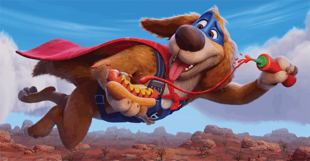
image c. 2025 Viva Kids
Abra-Cooking-Dabra Review
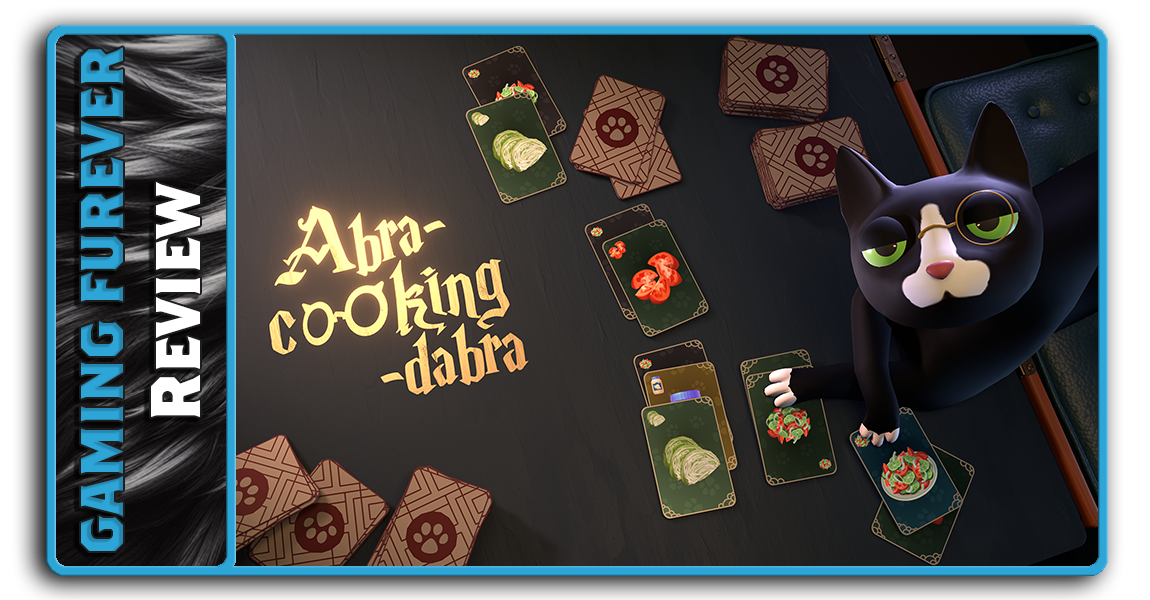
There can never be enough cooking games, and Abra-Cooking-Dabra, the newest gaming foray by developer Door 407, helps prove that theory. You’re whisked away to a mysterious new restaurant in London, where you must help an eccentric suave cat serve any customer that strolls up to your establishment. What makes this game different is the methods and challenges you’ll face along the way, all whilst using a card-based cooking system to make and serve meals. It’s as wild and weird as it sounds, and yet feels neatly crafted and comfy in execution, requiring harvesting all of your forethought and planning to perfect it.
TigerTails Radio Season 16 Episode 44

TigerTails Radio Season 16 Episode 44 Join the Discord Chat: https://discord.gg/SQ5QuRf Join the Telegram Chat: https://t.me/+yold2C77m0I1MmM0 Visit the website at http://www.tigertailsradio.co.uk. See website for full breakdown of any song credits, which is usually updated shortly after the show. Credits: Opening music: Magic by Hedge Haiden (Double Hedge Studios) Character art: Fitzroy Fox - https://www.furaffinity.net/user/lunara-toons / https://bsky.app/profile/fitzroyfox.bsky.social Background art: Charleston Rat - https://www.furaffinity.net/user/charlestonrat / https://bsky.app/profile/charlestonrat.bsky.social If you like what we do and wish to throw some pennies our way to support us, please consider sending a little tip our way. https://streamlabs.com/tigertailsradio/tip * Please note, tips are made to support TigerTails Radio and are assumed as made with good faith, so are therefore non-refundable. Thank you for your support and understanding.
Furrydelphia drops Twitter – can you #QuitYourX?
Bad habits die hard.
Let’s talk about how furries use Twitter (“X”), despite everything.
We all know what’s wrong with its biggest influencers and owner.

The world’s richest man bought the site to control information.
It’s not just to deceive you for politics —
His power rises by growing traffic of any kind.
Every active account gives him power; for or against, real or fake, traffic is power.
Meanwhile you’ll be trolled with denials of what you can see with your own eyes.

Going along with it is a choice.
The problem grows by using it for any reason, even to protest.
Leaving and taking your traffic away is the way to change this.
I chose to stop using my account a while ago. (Now it’s parked to prevent name squatting.)
That account had 10k followers gathered organically, with no ads, and I left the same way.

Dogpatch Press continues doing work that has always stood on its own.
Now here’s another positive example of such action.
It was their private choice.
They aren’t throwing shade or pushing about it.
They just set an example for others who share the same community.

Furrydelphia is only the 13th largest con, but they left ahead of cons with more power.
You can do it too.
What’s stopping you — maybe dependence on artist income?
Let’s talk about your power.
Do you like jokes about how furries run the internet?

This joke holds truth, because you can treat Twitter as like that airplane.
Furries are a small percent of users, but the kind with highest engagement.
Furries have often been trending topics.
Valuable users like this are key to keeping sites alive.
That means you aren’t too small to matter, and not stuck on one site.
Being alone can feel powerless, but there’s power to take action together.
Let’s look at how to do a power move.
Big cons have power to coordinate and make a leap together.
Conventions are like flagships of the furry community. The top 3 have over 180,000 Twitter followers, and drew around 55,000 attendees this year. Imagine if just these 3 agreed to move elsewhere at the same time (and gathered some influential community members to raise the number much higher.)
That’s not a huge percent of around 40 million active monthly American users on the site, but proportionally, that can make a huge impact on fandom. A small number of big accounts could make a community tipping point.
There’s a principle about collective power: a small number of strategically placed workers, in one union, can stop one business or industry, that stops a war or takes down a government. It’s like a pebble starting an avalanche.
Twitter won’t die just from furries leaving, but there is potential for collective action to remove one community. In fact, the more specific it is, the more potential there may be. When Twitter dies at some point, it will probably come from slow bleeding of valuable segments like that.
Consider how nonprofit cons don’t have to grow, yet the top cons are highly demanded, with rooms selling out and higher record attendance every year. That makes power to pull users where they go, rather than having to cater to where users are. That can lead to a tipping point that single income-dependent users may be reluctant to approach first. A small number of large users could make the choice easy for everyone else.

Ask them to lead and make a path to follow.
It doesn’t have to be instant. Do you know con staff? Start putting the idea in their minds. Raise demand for alternatives for an alternative community that doesn’t have to settle for the status quo.
Dogpatch Press has contacts who staff cons. Several (who obviously won’t be named) answered questions.
One con social media lead said:
“When the Elon Musk Twitter purchase originally happend, then when things started getting really bad, there was a lot of talk around it. It’s the same story as with everyone – “Oh, it’s not that bad. This is where all the furries are.” I really, really struggle with this like… am I crazy? Or is everyone else crazy? Elon Musk is a terrifyingly bad dude who’s openly trying to manipulate reality to support a white supremacist narrative. It’s not even hidden… Why are you on his platform? Nobody seems to care, everyone seems perfectly content just tumbling down the hill together.”
Another con staffer said:
“It’s worth a shot, but there’s an issue with foreign users who still only use Twitter and are relatively insulated from issues in Western space. Maintaining a Twitter account benefits those groups, and I don’t know if cons removing themselves from the platform would move those communities.”
Dogpatch Press said:
“When it’s for IRL events with one location, followers out of country must be much less than the effective majority. If info is replicated elsewhere like Telegram, then numbers don’t have to matter as much as accessibility, especially if cons have demand to pull instead of push towards a tipping point.”
Accomplishing this would be like being the tail that wags the dog. It’s quite a challenge, but that’s the power that makes fandom go. You also don’t have to wait for others to go first. Try starting the conversations, making hashtags like #goblue (sky) ? — and call it —
The #QuitYourX Challenge
Further insight about how many top X influencers are based in Russia, Nigeria, India, etc while manipulating American users as if they are here:
“The incredible genius Elmo the Musk decided for greater transparency to release where all of the X accounts are broadcasting from and it appears that over 60% of the biggest Maga influencers are in point of actual fact from either Nigeria or India removing any doubt whatever that the majority of congressional Republicans who often cited these influencers to steer American opinion towards what these foreigners think they should be doing rather than what is best for the American people.
Elmo quickly dispensed with this feature after he learned so many MAGA influencers were from Nigeria and India and he did things to repair the damage but it was too late because all the top liberal influencers screen grabbed where all these Charlatans were working from. Elmo turned the feature off I guess to give the accounts long enough to buy a VPN and change their countries of origin.” – Thomas Clay Jr.
“Developing the intellectual equivalent of an immune system against this kind of propaganda and fakery seems like a crucial part of collective survival, but there should also be the public-health equivalent of the major platforms not indulging it all, which they do because being the richest, seventh-richest etc. person on earth is not enough for these morally impoverished criminals. And yes, MAGA people seem to be exceptionally immune-compromised, and vice-versa, in this regard.” – Rebecca Solnit
Media-literacy about social-media is a public health issue. Cons have hosted physical health initiatives to play their part as central community resources. This may not be as big a challenge as you think!
Like the article? These take hard work. For more free furry news, follow on Twitter or support not-for-profit Dogpatch Press on Patreon. Want to get involved? Try these subreddits: r/furrydiscuss for news or r/waginheaven for the best of the community. Or send guest writing here. (Content Policy.)
Astro-Animals
More from MIPCOM: Centauri 5 is a new animated “space comedy” for kids, currently in production at Unicorn Entertainment and China Bridge. “The series follows the adventures of Titan, a Samoyed laboratory dog who was sent on a mission into deep space. After completing his mission, Titan refused to return to Earth and instead launched Centauri 5, a group of heroic former lab animals committed to helping other vulnerable creatures throughout the universe. Titan also wants to find his father, Roman, who was also sent into space years before but never returned. He is supported by Sophie, a fierce and brilliant wildcat scientist; Limbo, a good-natured sloth who’s an expert in AI; Bitsy, a young red panda who is an empath and can feel what others feel; and Drake, a robot who was discarded due to various design flaws which have turned him into a Luddite who believes technology is highly overrated!” Unfortunately we’ll have to wait until 2027 to see the results of all this creativity.
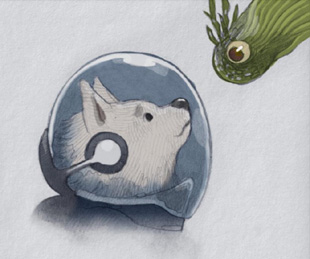
image c. 2025 China Bridge
Stay Focused & Furred with On-Together: Virtual Co-Working, Coming January 19th
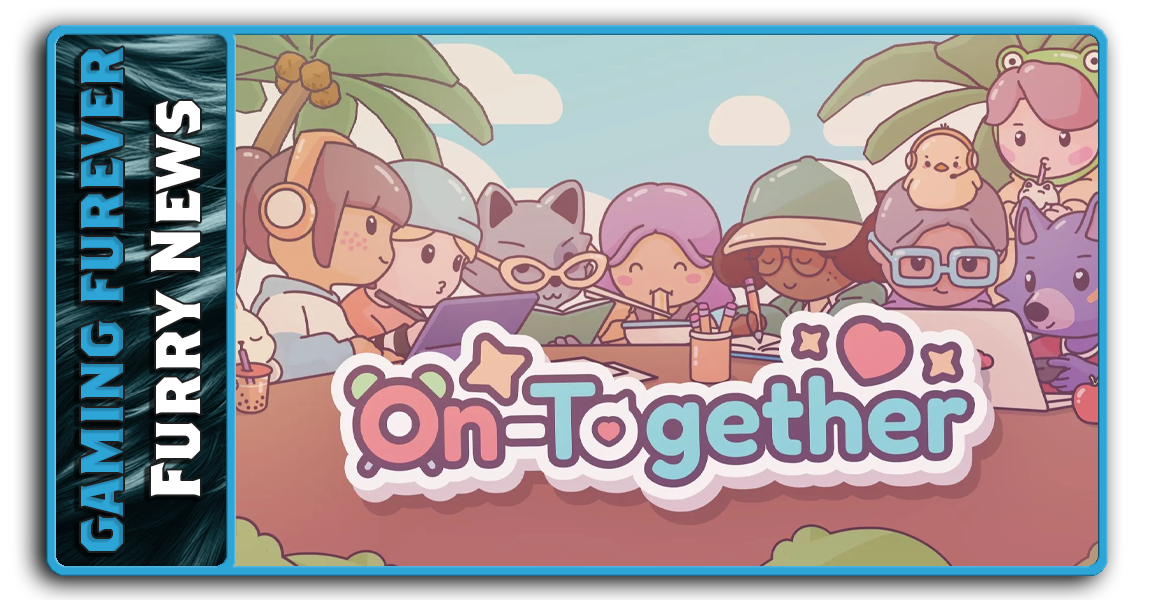
Everybody’s got work to do, so why not make those tasks more fun and connected? Feeling like you’re enjoying yourself (even just a little) while getting things done is a very recent trend, but one that I’m glad has grown so much. I wish I had the benefit of lo-fi tunes and little temporary visual treats like the demo of On-Together provided when I was in college. Developed by GigaPuff and Future Friends Games, On-Together is a Virtual Co-Working multiplayer productivity game that occupies a section of your screen, allowing you to keep up with whatever tasks you desire to work on while also enabling socialization, communal focus-keeping in-game locations, and little doses of dopamine with cute emotes, fishing, and engagement motivators. The demo is live now, and the full game was just announced for release on January 19th, 2026.
I really enjoyed my time padding around in the demo, and I’m actually using it right now whilst I write this preview article. You’re able to customize your character (up to 3 slots of pre-saved outfits), which includes plenty of adorable animal designs, including various tails, ears, and colorful “fur” choices. Some choices require earning and spending coins within the game itself before they can be equipped, which can be achieved by casual fishing, playing quick interactive activities, chatting and interacting with other people on your chosen server, or completing your own set up tasks within the game. Those coins can also be spent on little trinkets, drinks, and other fun items within the game. These can give your character fun visual effects, things to hold on to or wear, along with a nice discoverable set of interesting time-spenders during your breaks. Earning these little prizes made my next set of timed work sessions that much more enjoyable and focused. Of course, the included radio of calming, light background music was a huge plus, and one that will get heavy usage by yours truly. I’m looking forward to continuing to spend more time in On-Together, and believe it will be a cornerstone of quite a few people’s work process in the coming months, if it's popular demo population is any indication.
“In Furtopia, anyone can be anything”: Infurnity turns 10 at its biggest event yet

2025 兽无限「万兽方城市」 邀请兽迷们感受“动物城”之美
Shake your tails: the history, excitement and impact of the Furry Dance Scene from 2008-now
Guest post by Kamen the Lycanroc (Kameno-o)
Furry conventions are known to be a place to showcase the arts, and those include dancing. Alongside fursuit parades, music performances, and raves, dance competitions are a staple of the modern furry convention experience. Let’s look at how they got so loved, with memories from two deeply involved furries: Anthrocon’s long-time competition host Ronnie Noodles, and Tommy Dino, a member of the dance community.
Two ways to please crowds
Fursuit dance performances have gone from a small part of the con experience, to centrally scheduled main event attractions. Main event rooms are filled with people sitting both in chairs and on the floor to see fursuiters show off their dance skills and hype up the audience. Anthrocon, for example, saw over 80 applicants in 2025, with an estimated attendance of around 1500-2000 for the event.
Many people hear about dancing and only think of shows where fursuiters perform on stage, but there’s more to it than that. There are two kinds of dance shows present at furry events: Dance competition and Dance Battles.
Fursuit Dance competitions happen on stage with performers who make it past preliminary rounds, either in person or via audition videos. From there, finalists are selected to perform their own choreographed and rehearsed song and dance for 2-3 minutes, and graded by the judges.
Dance Battles, on the other hand, are teams of 2-3 competitors that face off with improvising to random music. Based on freestyle street dancing, the sides go back and forth, responding to each others’ dance. Then, the judges decide who goes forward from the performance.
The excitement goes beyond the halls of the convention center, as furry conventions are not shy about uploading performances onto social media such as Youtube. Anthrocon’s Youtube channel, for example, uploads the performances of dance competitions and their battle every year, raking in views for the channel. Their most popular video on their channel is the dance competition from 2018, which currently has 1.8 million views. (See above.)
From street culture to the cutting edge of furry culture

A global scene beyond language: Chinese fursuit dancer 银碳Gintan gets viral popularity.
Despite their status as a main stage event and major audience draw now, dance battles did not start off as a convention main stage event. Furry conventions have always had performances and masquerades, but the first official dance competitions took place in 2008, with Furry Weekend Atlanta and Anthrocon being the first to host them. From there, the furry dance competitions grew across other cons such as Midwest Furfest and Further Confusion, with the intention to bring out the best of dance stage performance, led by people devoted to raising the bar.
Dance Battles followed suit in the early 2010s, as more furry dancers started to bring in more street culture and street dancing. Freestyle dance battles, the predecessor to official dance battles, appeared at Further Confusion in 2012. Dance battles debuted officially at Anthrocon in 2012, where it’s called “Floor Wars.” From there the subculture grew to what many are accustomed to today. Many furry dancers established themselves and became a part of what are considered the first wave of dancers such as J.D. Puppy, Jibba, Theome, and Neo Pan Tyger.
[Editor note: it’s interesting that now-staple dance competitions were only established as recently as 2008. That was almost a generation after the first furry con, and marked a somewhat key turning point in growth, as remarked in a 2011 blog article: Furry, not an obscure little fandom any more. It’s illustrated with a graph of con attendance that was rapidly spiking then, which continues now. Notice how the aggregated count of around 16,000 attendees for all cons in 2008 was about the same as the single-con record set by Midwest Furfest in 2024, which we can expect to keep rising as we approach another new generation point in time.
Dancers have been at the cutting edge of this boom, paired with the rising quality of fursuit craft. Compare the look of suits then and now, while dancing brings them to life — a perfect marriage of makers and performers. While this story has American POV from looking at the roots, in recent years performers emerging from Chinese and K-pop scenes have been gaining viral views that bleed across national and language lines.]
Dragged in to dance, then to organize: “Really fun but also really frightening”
One of the dancers who were there from the early years is Ronnie Noodles, a recognizable face in the furry dance community. Aside from being one of the main organizers for Anthrocon, Ronnie has served as the host for Anthrocon’s dance competitions since 2015.
An active dancer since 2008, Ronnie never intended to perform at furry events. This changed, however, after he attended his first Anthrocon in 2010. There, he was “dragged” physically by J.D. Puppy and Doryuu Shepherd into his first fursuit dance competition, and his fursuit dancing career began.
“I was physically and literally dragged into the dance competition after being recognized for my dance posts,” said the organizer. “There I was, in the middle of this dance qualifier. Anthrocon 2010 became my first dance competition experience. That became an experience for me that I would sum up as really fun but also really frightening at the same time, but somehow I made it through.”
Ronnie continued to perform at competitions at Anthrocon until 2015, when J.D.Puppy stepped down and offered Ronnie the opportunity to host for dance competitions. Ronnie has been hosting the Anthrocon dance competitions for the decade since.

Ronnie Noodles serving as the host of the Anthrocon 2025 dance competition. (Photo Credit: Kaze_Shiba)

Ronnie in 2025: “This #Anthrocon marks 10 years of me organizing/hosting Anthrocon’s Fursuit Dance Competition. I’ve been doing Floor Wars for even longer (since 2012).”
As the main organizer of the dance competition, Ronnie’s tasks include selecting the judges, scheduling the dancers, and working with the other dancers and staff members to ensure the competition runs smoothly. Ronnie balances both managing the con but also ensuring the dance competitions run without issues. Throughout this, Ronnie kept noticing how with the increase in popularity and applicants, the competition kept growing bigger and bigger.
“As the years went on and people started taking notice, the crowd then started saying “dance competition is cool and all, but dance battles are also cool,”” remarks the dragon. “These statements started picking up, leading to the dance battles becoming too popular. This led to transitions to bigger rooms with proper equipment and AV floors. We just kept on growing bigger and bigger.”
“Who I do this for”: Competing to make community
Organizers and dancers like Ronnie helped to organize and create dance competitions, making them main events that draw many people to not only come in to watch, but to start practicing their own talent to perform and compete to win. One of the people drawn in was dancer Tommy Dino.
Debuting at Furpocalypse 2022, Tommy was nervous and felt unworthy. With encouragement from his friends and mentor, Eden, he was able to not only get on stage, but find a place as a regular furry dance community member. He connected with other dancers to improve his performance and make friends, something that motivates him beyond competition.
“I didn’t get to where I am now on my own, and it’s really heartwarming for me every time I step out onto the stage,” remarked Tommy. “I get to see the cheerful faces of everyone I’ve come to know. The dancers, my local furs who have been my anchor through it all. It’s a hard feeling to describe, but, in a sense it fills me with pride! And seeing everyone’s wonderful faces reminds me exactly why I enjoy performing, and who I do this for.”

Tommy Dino performing alongside Toko in the Furpocalypse 2025 dance competition. (Photo Credit: Fiendfoto)
Outside of furry conventions, Tommy attends dance classes, which varies from hip hop to contemporary and house. Whatever he learns, he applies to his routines, helping him in planning and choreographing his performances for cons. This helped for his recent performance at Furpocalypse, in which he entered with fellow dancer Toko, as “double T diner”. It was a new experience for Tommy to learn to adapt to his partner’s style after practicing it on his own.
As he prepares for his next con, he has one thought on his mind: to get better and improve his skill. He credits his success and improvement to not only his own talent, but the quality of help from the dance community along the way.
“The dance community is very welcoming and helpful to everyone regardless of their skill level. If you need any sort of tips on how to get started, there’s definitely people that’ll help if you ask,” said Tommy.
The furry fandom is growing bigger than ever, and with it more dancers are coming onto the scene and competing at dance battles and dance competitions. As the new year gets near and dance programming gets ready for next year’s events, the sentiment remains the same for dancers like Tommy and Ronnie: no matter how the scene grows, everyone’s invited to step up and jump in.
Kamen the Lycanroc (aka Kameno-o) is a furry journalist in New England who has a passion for writing about the events, culture, and people of the furry fandom, as well as video and audio editing, LGBTQ history, and Sonic the Hedgehog. His previous story featured New York City furry events.

Much appreciation to Blackdeer0330 for noticing. A story about the international dance scene would make a good followup.
Like the article? These take hard work. For more free furry news, follow on Twitter or support not-for-profit Dogpatch Press on Patreon. Want to get involved? Try these subreddits: r/furrydiscuss for news or r/waginheaven for the best of the community. Or send guest writing here. (Content Policy.)